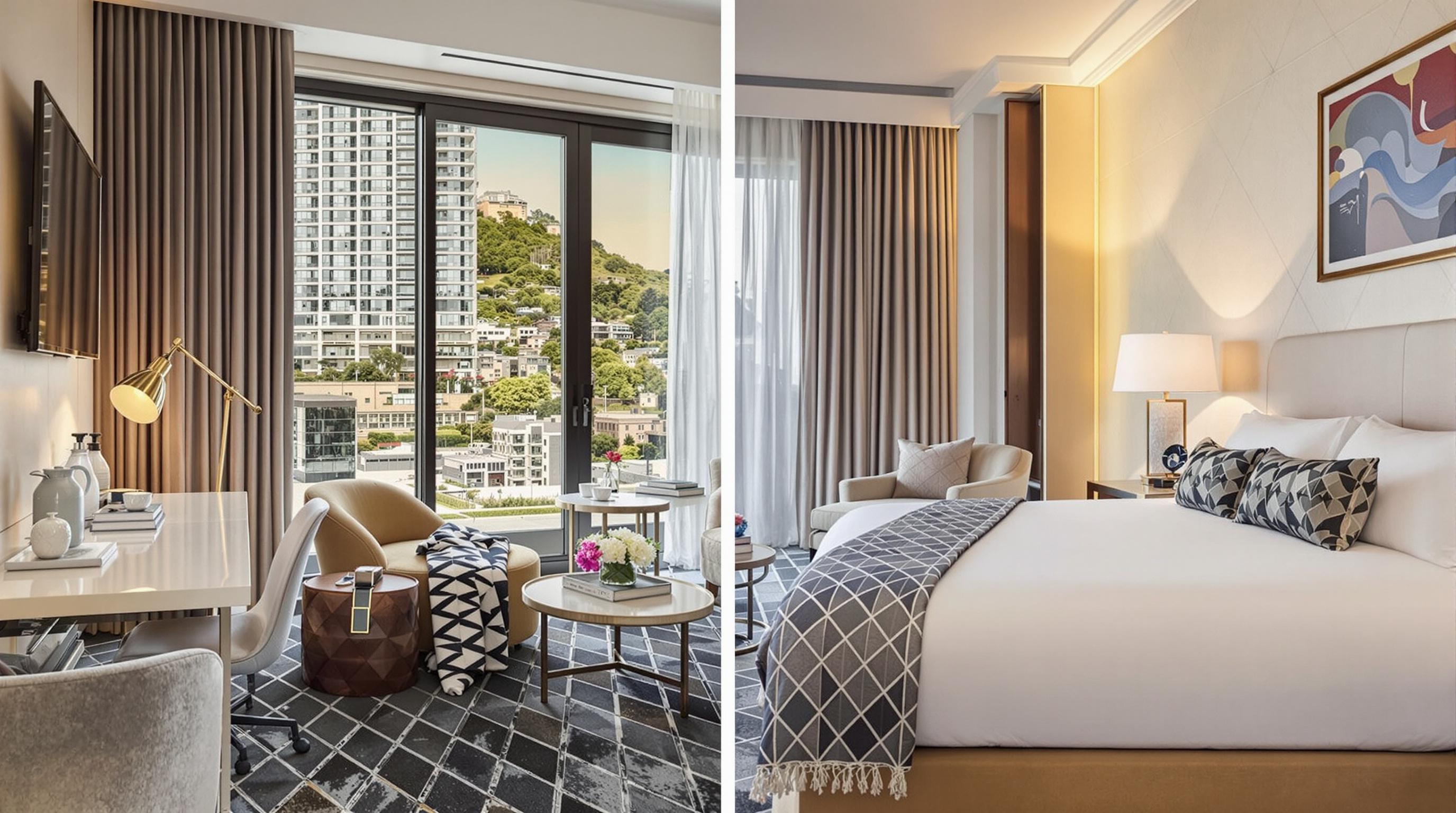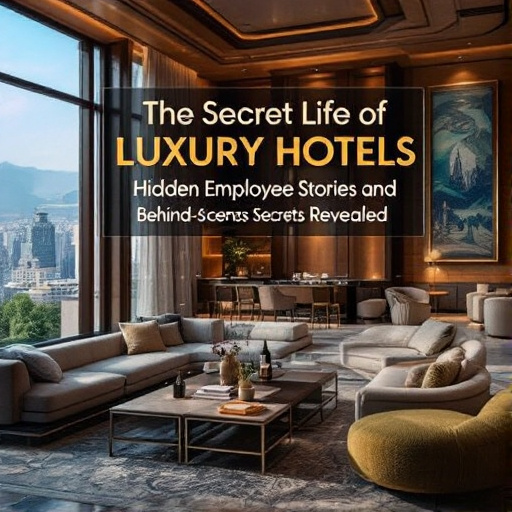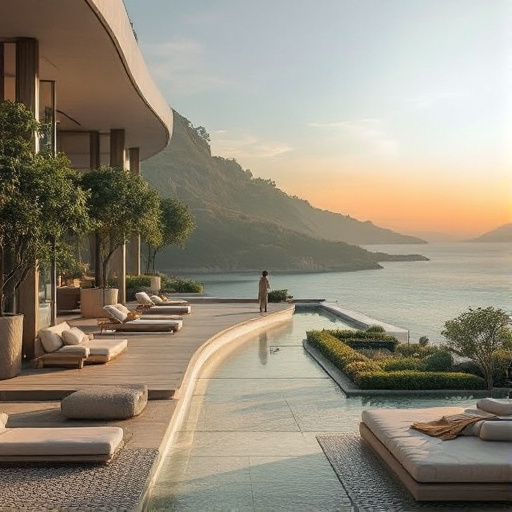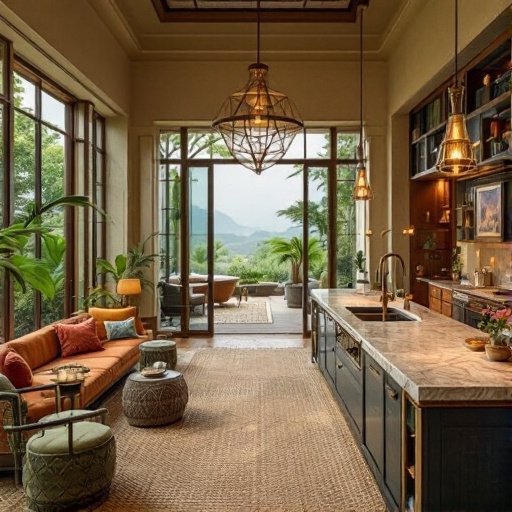Featured Articles
- 7 Unseen Amenities in Luxury Hotels That Transform a Stay into an Exclusive, Personalized Experience
- "Beyond Opulence: Exploring the Rise of Sustainability in Luxury Hotel Design"
- "How Eco-Friendly Luxury Hotels Are Reshaping Sustainable Travel: A Glimpse Into the Future of Opulence"
- The Rise of Eco-Luxury: How Sustainability is Shaping the Future of Upscale Hospitality
- The Rise of Eco-Luxury: How Sustainable Practices are Redefining High-End Hospitality
"Beyond Opulence: Exploring the Rise of Sustainability in Luxury Hotel Design"
"Beyond Opulence: Exploring the Rise of Sustainability in Luxury Hotel Design"
The luxury hotel industry is undergoing a significant transformation as it embraces sustainability as a core value, moving away from mere opulence. This article delves into the innovative designs, materials, and practices that illustrate the harmonious blend of luxury and eco-consciousness in modern hospitality.
The Paradigm Shift: Luxury Meets Sustainability
It’s not just a fad; it’s a movement. An astonishing 65% of travelers now consider sustainable travel options as an essential criterion when booking their accommodations (Booking.com, 2023). As environmental concerns grow, the luxury hotel sector is responding to travelers’ desires for more sustainable options without compromising elegance and comfort.
The New Definition of Luxury
Once upon a time, luxury was defined by extravagance—think gold-plated fixtures and oversized marble bathtubs. However, a new narrative is taking over. The modern luxury hotel experience is increasingly being characterized by its commitments to sustainability. For example, the visionary leadership at Six Senses Hotels Resorts Spas positions personal wellness and environmental sustainability at the forefront of their business model, reflecting a broader trend that values the planet as much as plush linens (Six Senses, 2023).
The idea that sustainability can coexist with luxury is not merely aspirational; it’s achievable. As futurist Edie Weiner once said, “The future is not a gift; it is an achievement.” With that attitude, luxury hotels are beginning to embrace local cultures and environmentally friendly practices while maintaining the quality that guests have come to expect.
Innovative Design: A Playful Approach
Next, let’s talk about design! Picture walking into a lobby where the ceiling features intricate patterns derived from nature, made not from synthetic materials but upcycled wood. The House Hotel in Bodrum, Turkey, utilizes sustainable materials sourced locally while providing stunning views of the Aegean Sea. This isn’t just design; it’s a love letter to Mother Earth wrapped in opulence. Guests are delighted to know that every design choice respects the environment while exuding luxury.
Additionally, many hotels, like the luxurious 1 Hotel South Beach in Miami, have turned their roofs into urban gardens, further promoting biodiversity. Designed with reclaimed materials and natural light in mind, they not only make a striking first impression but also serve as a powerful reminder of the beauty of sustainable design.
From Sourcing to Sustainability
Speaking of local sourcing, consider the culinary aspect of luxury hotels. It turns out, what’s on your plate reflects a broader environmental ethos. Hotels like the Natori Hotel in Japan emphasize using locally sourced, organic ingredients in their fine dining options. It’s a market trend all too apparent: the world is hungry for not just gourmet experiences but also responsible ones. With a mission to create a positive impact, the chefs there aren’t just culinary artists; they’re responsible stewards of local ecosystems.
Technology and Sustainability: A Designer's Best Friend
Let’s hear it for technology! Modern innovations are playing a crucial role in marrying sustainability with luxury. Smart systems have been the game-changer, enabling hotels to optimize their energy consumption dramatically. For instance, the IoT-based energy management systems in the Waldorf Astoria in Amsterdam optimize energy use while offering guests all the comforts. Imagine being able to adjust room temperature via your smartphone, knowing that energy savings will follow! In a study, hotels that implemented smart technologies reduced energy costs by an impressive 30% on average (Smith Travel Research, 2023). Talk about luxury—and sustainability—at its finest!
Anecdote: A Weekend Stay that Changed Perspectives
Let’s step back for a moment and hear a little personal vocation. Last summer, I stayed at a luxury eco-resort in Costa Rica. I recall sipping organic coffee grown right in their own garden while half-listening to a sustainable living workshop led by the head gardener. There I was, knee-deep in natural luxury, learning about permaculture and carbon offsets while my friends were simply envious of my Instagram posts. Who knew a simple weekend getaway could turn into an enlightening experience?
Case Study: The Ritz-Carlton’s Green Initiative
In an extensive survey of champions in this arena, the Ritz-Carlton has become a case study for its Green Initiative. By implementing a series of eco-friendly practices ranging from waste reduction to sustainable sourcing, they have successfully launched over 30 luxury hotels pursuing LEED certification. This initiative has led to water savings of about 8% in their properties, which might seem small but translates to hundreds of thousands of gallons saved annually.
Not only are they creating remarkable guest experiences, but they’re also championing a critical transformational model within the hospitality industry.
The Joy of Green Operations
While it is easy to look at these changes as strictly operational, wouldn’t it be cool to think of them with a touch of humor? I mean, who would have thought that recycling your shampoo bottle in a luxury hotel could be as chic as a Fondue party at a Parisian café? Instead of tossing leftover toiletries, guests can donate them, creating a momentum that gives us the perfect excuse to brag about our eco-missions during dinner conversations.
The Impact of Eco-Conscious Marketing
Moreover, how these hotels position themselves plays a pivotal role in the sustainability dialogue. Marketing strategies are shifting focus towards transparency and eco-conscientiousness. A study noted that 74% of travelers prefer brands demonstrated a commitment to environmental responsibility. Hotels that effectively convey their sustainability initiatives often find greater loyalty and bookings. This trend undoubtedly shapes the ongoing paradigm shift in the hospitality industry.
What Guests Are Saying
But what do guests really think? The feedback loop from travelers is critical for the luxury hotels navigating this new territory. TripAdvisor reviews often highlight specific features, like the organic produce in the hotel restaurant or the eco-friendly design of a property, making it pretty clear that guests appreciate and engage with sustainability efforts. It's the conversations from previous guests that usher in a hopeful future for the hospitality experience.
Conclusion: A Luxurious Future Awaits
In conclusion, the luxury hotel industry is a microcosm of the broader socio-environmental changes occurring globally. It’s not just about plush experiences anymore but creating sustainable legacies. As consumers, it is our newfound responsibility to hold these establishments accountable while enjoying the decadent experiences they offer.
For a 70-year-old hotelier, the allure of sustainability might spark a nostalgic return to simpler times when hospitality was defined by care for people and the earth. For a 16-year-old traveler, this could be the foundation upon which their future escapades are built—full of mindful choices and eco-friendly adventures.
Beyond opulence, we are entering an exquisite phase of hospitality where sustainability is not merely a plot twist but the main story. So, the next time you book a luxurious stay, remember: it’s not just a room or a view; it’s an opportunity to be part of something bigger.



